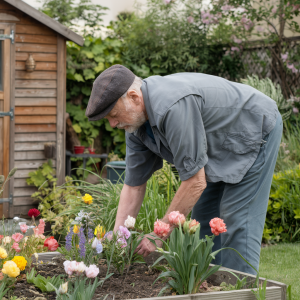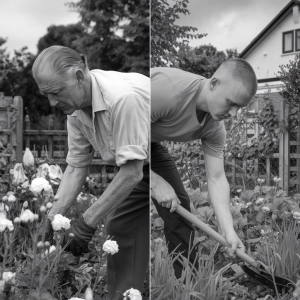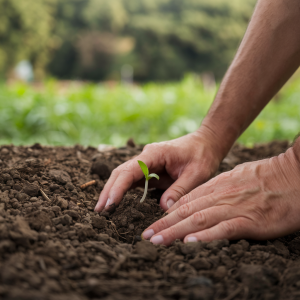Far away from war zones but still healing from the effects of service, veterans across the UK are discovering how gardening can support their mental health. Accessible through veterans’ gardening programmes or simply connecting with nature at home, working with the land is helping veterans with PTSD find peace across the country.
Below, we explore the mental and physical benefits of gardening and how to get started with horticultural therapy.
Generations of Healing
Awareness of the mental health benefits of gardening is growing among ex-service members. But this old-school healing modality has been soothing veteran souls for generations.
Returning service members from the First and Second World Wars began growing food at home to supplement family groceries and manage food costs. After the Second World War, food rationing remained in place for years, and many veterans turned to gardens for sustenance and solace.
It wasn’t called horticultural therapy yet, but UK veterans gradually found peace in tending gardens and building their greenhouses over the following decades. Many of us grew up with veteran grandfathers who found joy and purpose in the garden.
How Can Gardening Help Veterans with PTSD?
For most of human history, we weren’t clocking into factories or sitting at desks. Working with the earth is a natural part of our being, and returning to it can be profoundly healing.
Gardening offers special advantages to veterans suffering from PTSD. Across the UK, ex-service members are discovering how working with the Earth can:
Reduce Stress Levels
Getting outside and connecting with nature is good for mental health. Studies continually show how gardening reduces levels of the stress hormone cortisol, calming the nervous system and promoting healing. One study even found it more effective than reading for stress relief.
Introduce Mindfulness
Quiet meditation can be difficult for veterans with PTSD. Working the soil without worrying about the harvest offers a way to practise mindfulness. This intentional and purposeful activity can ease anxiety and build self-esteem.
For busy minds, gardening engages the senses—smelling freshly dug earth, feeling the breeze on your skin, and nurturing plants—all of which bring focus to the present moment.
Help to Re-establish Routine
PTSD and other mental health struggles can leave veterans feeling lost and without structure. Losing the strict routine of military life can be disorienting until a new structure is created.
Caring for a garden, whether at home or with a veterans’ horticultural group, can help reintroduce purpose. Daily gardening tasks can create meaningful routines, especially on days when motivation feels out of reach.
Create Feelings of Accomplishment
Small wins can make a big difference. Cooking with home-grown vegetables, sharing a small harvest with the community, or even building a garden shed can be powerful steps toward rebuilding confidence.
Overcoming obstacles in the garden—like managing pests or weather challenges—can bring a sense of achievement. Harvesting the fruits of your labour becomes even more rewarding.
Improve Nutrition
Neglecting nutrition is common when struggling with PTSD, yet healthy eating is vital for well-being. Gardening not only provides fresh produce but also encourages better eating habits as you learn more about food and cultivation.
Consider using a garden shed or greenhouse to create a supportive space for nurturing your plants and yourself.
Help to Regain a Sense of Control
The unpredictable symptoms of PTSD can make veterans feel like life is spiralling out of control, leading to anxiety and panic attacks. Gardening counters these feelings with its grounding and physical nature.
Planning and caring for a garden allows veterans to predict and influence outcomes, helping rebuild confidence in their ability to manage life.
Building Community for Veterans
Isolation is a common side effect of PTSD. When veterans want to socialise, they can feel out of place or misunderstood.
Veterans’ gardening programmes provide a unique environment of understanding and support. Programmes like the Men’s Sheds Association connect veterans to shared activities (including but not limited to gardening) that foster camaraderie and purpose.
Where to Find Gardening Programmes for Veterans in the UK
Gardening programmes for veterans offer more than therapy; they also provide employment opportunities, skill development, and social support. Some of the most prominent programmes include:
- Veterans Outdoors: Based in the South West, this charity offers horticultural therapy on local farms alongside unique experiences like wildlife photography and dry stone walling.
- Defence Gardens: A national provider of nature-based therapy for ex-service members and their families, promoting healing and purpose after military life.
- High Ground: This programme focuses on horticultural therapy, land-based employment, and self-employment for veterans and reservists.
- Royal British Legion: A central organisation offering resources for veterans, including pathways to horticultural therapy and other support services.
Final Thoughts
Living with PTSD is a long battle, but healing is a journey. Taking a holistic approach with various therapies, including gardening, can help veterans find their path forward.
Gardening reconnects us with nature while offering numerous mental health benefits. It lowers stress, builds confidence, and helps veterans regain a sense of control.
Joining a veterans’ gardening programme combines therapy with community, providing support, skill-building, and even job opportunities. Whether starting small at home or joining a local group, gardening can be a transformative step toward healing.




